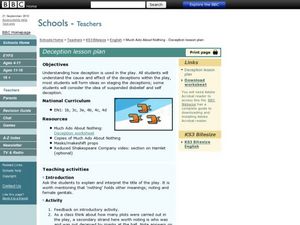Curated OER
Claudio and Hero Lesson Plan
Students examine the roles of arranged marriage through their work with Shakespeare's, Much Ado About Nothing. They look at the roles of Claudio and Hero, and determine how their marriage could be considered to be arranged. They complete...
Curated OER
Deception Lesson Plan
Students explore Shakespeare's portrayal of deception. In this plot lesson, students examine the use of deception in "Much Ado About Nothing." Students write their own mini-versions of the play that are limited to 3 minutes.
Curated OER
Much Ado About Nothing Masks Lesson
Learners examine the personality traits of characters. In this characterization lesson, students read act 2 of "Much Ado About Nothing" and create masks to represent the characters in the play.
Curated OER
Much Ado About Nothing: Hero and Claudio
In this Hero and Claudio worksheet, students read the book Much Ado About Nothing and fill out a graphic organizer on the potential partners that they would choose based on the book. Students choose 3 important qualities and then...
Curated OER
Much Ado About Nothing
Students explore the genre of romantic comedy through their reading of Much Ado About Nothing. In this literary genres instructional activity, students study the genre of romantic comedy through their reading of Much Ado About Nothing....
Curated OER
Writing Task
Eighth graders consider parallel relationships in Much Ado About Nothing and the structure of the play within an extended piece of writing. In this point of view instructional activity, 8th graders examine relationships and write a...
Curated OER
Change slander to remorse: Unscripted Scenes
Students hypothesize about the content of unscripted moments, search for evidence in the actual text to support their hypothesis, and explore how this hypothesis would affect characterization.








